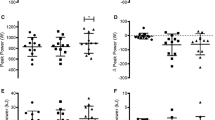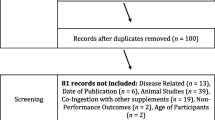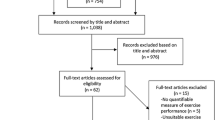Abstract
Background
Taurine is central to many physiological processes, some of which are augmented by exogenous supply and have the potential to facilitate endurance performance; however, its independent effects on performance have not been systematically analysed.
Objective
To evaluate the effects of isolated oral taurine ingestion on endurance performance and to assess the contribution of (1) the dose and (2) the supplementation period to the ergogenic effect.
Methods
A search was performed using various databases in September 2017. The studies were screened using search criteria for eligibility. Ten peer-reviewed articles were identified for inclusion. A sub-analysis of time-to-exhaustion (TTE) trials (n = 7) was also performed. The effects of (1) dose and (2) the acute (single dose) or chronic (> 1 day) supplementation periods were assessed using meta-regression. The doses of taurine ranged from 1 to 6 g/day and were provided in single doses and for up to 2 weeks among a range of subjects.
Results
Taurine ingestion improved overall endurance performance (Hedges’ g = 0.40, 95% CI 0.12–0.67, P = 0.004), which was similar in TTE trials (Hedges’ g = 0.43, 95% CI 0.12–0.75, P = 0.007). There were no differences between acute or chronic supplementation for the full sample (P = 0.897) or the TTE group (P = 0.896). The dose of taurine did not moderate its effect on endurance performance (P > 0.05).
Conclusion
Human endurance performance can be improved by orally ingesting a single dose of taurine in varying amounts (1–6 g).



Similar content being viewed by others
References
McLellan TM, Lieberman HR. Do energy drinks contain active components other than caffeine? Nut Res. 2012;70:730–44.
Stapleton PP, Charles RP, Redmond HP, Bouchier-Hayes DJ. Taurine and human nutrition. Clin Nutr. 1997;16:103–8.
Huxtable JR. Physiological actions of taurine. Physiol Rev. 1992;72:101–63.
Hamilton EJ, Berg HM, Easton CJ, Bakker AJ. The effect of taurine depletion on the contractile properties and fatigue in fast-twitch skeletal muscle of the mouse. Amino Acids. 2006;31:273–8.
Dutka TL, Lamboley CR, Murphy RM, Lamb GD. Acute effects of taurine on sarcoplasmic reticulum Ca2+ accumulation and contractility in human type I and type II skeletal muscle fibers. J Appl Physiol. 2014;117:797–805.
Hansen SH, Andersen ML, Birkedal H, Cornett C, Wibrand F. The important role of taurine in oxidative metabolism. Adv Exp Med Biol. 2006;583:129–35.
Ito T, Yoshikawa N, Schaffer SW, Azuma J. Tissue taurine depletion alters metabolic response to exercise and reduces running capacity in mice. J Amino Acids. 2014. https://doi.org/10.1155/2014/964680.
Souza DB, Del Coso J, Casonatto J, Polito MD. Acute effects of caffeine-containing energy drinks on physical performance: a systematic review and meta-analysis. Eur J Nutr. 2017;56:13–27.
Bakker AJ, Berg HM. Effect of taurine on sarcoplasmic reticulum function and force in skinned fast-twitch skeletal muscle fibres of the rat. J Physiol. 2002;538:185–94.
Zhang M, Izumi I, Kagamimori S, Sokejima S, Yamagami T, Liu Z, Qi B. Role of taurine supplementation to prevent exercise-induced oxidative stress in healthy young men. Amino Acids. 2004;26:203–7.
Moher D, Shamseer L, Clarke M, Ghersi D, Liberati A, Petticrew M, Shekelle P, Stewart LA. Preferred reporting items for systematic review and meta-analysis protocols (PRISMA-P) 2015 statement. Systematic Reviews, 4:1 http://www.systematicreviewsjournal.com/content/4/1/1. Accessed 08 Mar 2018.
Baker JS, McCormick MC, Robergs RA. Interaction among skeletal muscle metabolic energy systems during intense exercise. J Nutr Metab. 2010. https://doi.org/10.1155/2010/905612.
Higgins JP, Altman DG. Assessing risk of bias in included studies. In: Higgins JP, Green S, editors. Cochrane handbook for systematic reviews of interventions: cochrane book series. Chichester: Wiley; 2008.
Lee HM, Paik IY, Park TS. Effects of dietary supplementation of taurine, carnitine or glutamine on endurance exercise performance and fatigue parameters in athletes. Korean J Nutr. 2003;36:711–9.
Rutherford JA, Spriet LL, Stellingwerff T. The effect of acute taurine ingestion on endurance performance and metabolism in well-trained cyclists. Int J Sport Nutr Exerc Metab. 2010;20:322–9.
Beyranvand MR, Khalafi MK, Roshan VD, Choobineh S, Parsa SA, Piranfar MA. Effect of taurine supplementation on exercise capacity of patients with heart failure. J Cardiol. 2011;57:333–7.
Balshaw TG, Bampouras TM, Barry TJ, Sparks SA. The effect of acute taurine ingestion on 3-km running performance in trained middle-distance runners. Amino Acids. 2013;44:555–61.
Kammerer M, Jaramillo JA, Garcia A, Calderon JC, Valbuena LH. Effects of energy drink major bioactive compounds on the performance of young adults in fitness and cognitive tests: a randomized controlled trial. J Int Soc Sport Nutr. 2014;11:44.
Milioni F, Malta ES, Rocha LG, Mesquita CA, Zagatto EC. Acute administration of high doses of taurine does not substantially improve high-intensity running performance and the effect on maximal accumulated oxygen deficit is unclear. Appl Physiol Nutr Metab. 2016;41:498–503.
Ward R, Bridge CA, McNaughton LR, Sparks SA. The effect of acute taurine ingestion on 4-km time trial performance in trained cyclists. Amino Acids. 2016;48:2581–7.
Ahmadian M, Roshan VD, Ashourpore E. Taurine supplementation improves functional capacity, myocardial oxygen consumption, and electrical activity in heart failure. J Diet Supp. 2017;14:422–32.
Warnock R, Jeffries O, Patterson S, Waldron M. The effects of caffeine, taurine or caffeine-taurine co-ingestion on repeat-sprint cycling performance and physiological responses. Int J Sports Physiol Perform. 2017;24:1–24.
Lipsey MW, Wilson DB. Practical meta-analysis. London: Sage; 2001.
Rosenthal R, Rosnow RL. Essentials of Behavioral research: methods and data analysis. New York: McGraw-Hill; 1984.
Arad M, Adler Y, Koren-Morag N, Natanzon S, Sela BA, Ben DI, Shechter M, Schwammenthal E, Freimark D. Exercise training in advanced heart failure patients: discordance between improved exercise tolerance and unchanged NT-proBNP levels. Int J Cardiol. 2008;126:114–9.
Baraas F, Rilantono L, Diniharini S, Kurniawan I, Christian R, Kusmana D. Effect of short-term low-intensity exercise training on association of oxygen free radicals and nitric oxide production in patients with acute myocardial infarction. Int J Angiol. 2013;22:159–64.
Doherty M, Smith PM. Effects of caffeine ingestion on exercise testing: a meta-analysis. Int J Sport Nutr Exerc Metab. 2004;14(6):626–46.
Shao A, Hathcock JN. Risk assessment for the amino acids taurine, l-glutamine and l-arginine. Regul Toxicol Pharmacol. 2008;50:376–99.
De Carvalho FG, Barbieri RA, Carvalho MB, Dato CC, Campos EZ, Gobbi RB, Papoti M, Silva ASR, de Fraitas EC. Taurine supplementation can increase lipolysis and affect the contribution from energy systems during the front crawl maximal effort. Amino Acids. 2018;50(1):189–98.
Author information
Authors and Affiliations
Corresponding author
Ethics declarations
Funding
No sources of funding were received in the preparation of this article.
Conflict of interest
Mark Waldron, Stephen Patterson, Jamie Tallent and Owen Jeffries have no conflicts of interest directly relevant to its contents.
Rights and permissions
About this article
Cite this article
Waldron, M., Patterson, S.D., Tallent, J. et al. The Effects of an Oral Taurine Dose and Supplementation Period on Endurance Exercise Performance in Humans: A Meta-Analysis. Sports Med 48, 1247–1253 (2018). https://doi.org/10.1007/s40279-018-0896-2
Published:
Issue Date:
DOI: https://doi.org/10.1007/s40279-018-0896-2




